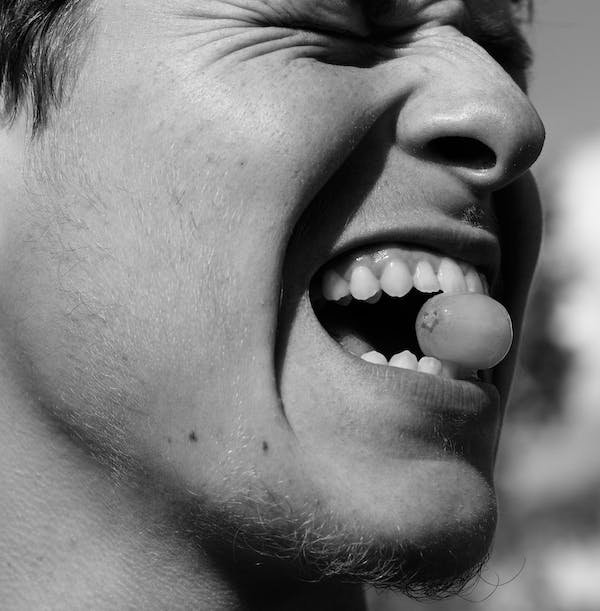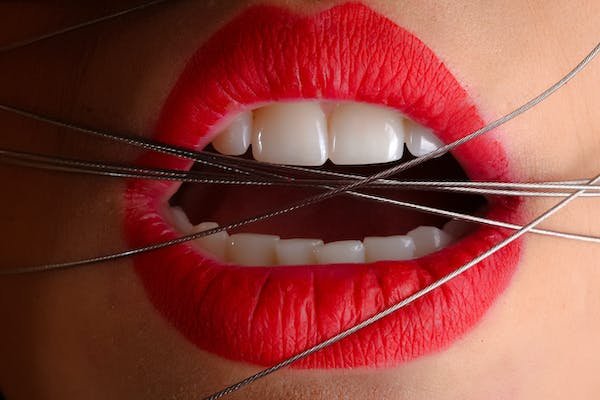My Experience with Teeth Sensitivity.
Do you know how it feels when you are unable to eat lots of meat like every other person, or when you cannot chew gum for as long as you want, that is the way I feel sometimes and it is not a funny experience at all. In Nigeria, during the festive season, we usually have so much to eat and drink and every child in the house tries to at as much as their stomach can take, but for me, as much as I love to eat meat, my sensitive teeth will not let me have as much as I want to, I also cannot try to use a hard toothbrush because I understand the nature of my teeth and how sensitive it is. I would still go for a proper teeth check-up and treatment, but that is when I can properly afford it, before then however, how do we describe teeth sensitivity and how can we find a solution to it?

pexels.com
A layer of enamel, which happens to be the strongest substance in the body, functions by protecting the crown of healthy teeth. The layer known as cementum protects the root of the tooth under the gum line, and underneath the enamel and the cementum is where dentin is, dentin is a part of the tooth that is less dense than the enamel or cementum. The dentin also contains microscopic tubules, which are small hollow tubes or canals, at the point when the dentin loses its protective covering, the tubules will then give room for heat, cold, acidic, or sticky foods to stimulate the cells and the nerves inside the tooth. This would result in hypersensitivity and discomfort from time to time during the process of chewing, breathing through the mouth, and drinking extremely cold and hot liquids.
The painful feeling associated with the consumption of extra cold and hot items could be a sign of cavities, but it is also very common with people who have highly sensitive teeth. The pain could be either temporary or chronic, it could affect one tooth or several teeth, and in some cases, all the teeth will be affected. Teeth sensitivity would result in pain or discomfort in response to some form of triggers, the triggers include; cold air, sweet beverages and food, cold water, hot beverages, and food, brushing teeth, acidic beverages and food, and alcohol-based mouth rinse.
Taking care of the teeth and the mouth is an important step that needs to be taken in order to prevent tooth decay and periodontal disease, not forgetting as well that brushing your teeth a little too hard, may expose your gum and result in exposure to tooth roots. Periodontal disease is an infection that affects the gum and bone that supports the teeth, if left untreated, it could develop until the point where the tissues would be able to separate from the teeth and form spaces called pockets that give room for bacteria. Speaking of periodontal disease, it can develop until the point where the bone and the other tooth-supporting tissues get destroyed leaving the root surface of the teeth exposed. It is with the help of a regular dental checkup that there would be an avenue for the prevention of tooth decay, periodontal disease, and other problems that may be detected and treated on time at its early stage.

pexels.com
Several treatments are made available for teeth sensitivity, a dental professional could prescribe some home remedy that would take the pain and uneasiness away, this may include the use of a desensitizing toothpaste, these toothpaste products would contain ingredients that would help prevent uncomfortable sensations from getting to the nerves, normally, several applications would be processed to get to the point of reduction in sensitivity. Asides from these home remedies, other professional treatments include;
Fluoride gel: This treatment option strengthens the tooth enamel and limits the transference of sensations to the nerve.
Root canal: This option is used in case of severe tooth sensitivity, a professional may even recommend root canal therapy.
Gum tissue graft: If the sensitivity is felt as a result of gum tissue receding from the tooth, then a gum graft will be carried out to help repair the gum and help protect the root of the tooth.
Crown, filling, or bonding: These treatment options are responsible for the covering, filling, or repair of cracks and gaps in the teeth, covering any exposed nerve.
I also read from a publication that teeth sensitivity can be prevented from occurring, experts suggest that these techniques would help out a lot;
ensuring oral hygiene, constant brushing of the teeth whether there is a case of tooth sensitivity or not, and the use of toothpaste that contains fluoride, flossing, and gentle mouthwashes can help in the prevention of even other forms of teeth sensitivity.
Brushing appropriately: Advisably, toothbrushes are to be changed every 2-3 months or as soon as they get worn out, brushing teeth as the last thing that happened at night and at least once during the day will be a lot of advantage.
Stay away from chemical products: Some dental products may contain abusive chemicals that damage the gums and teeth, so always make sure that you check through the chemical content of any product you are using in order to ensure its safety for your teeth.
Dental appointments: Dental appointments should never be taken for granted, dentists will be able to help with any case of tooth care or teeth issue.
I happen to be the only one with tooth sensitivity in my family, so I really don't know where I got that from, I am currently managing the situation by sadly limiting the amount of meat I consume and brushing consistently as much as I can, of course, as soon as I am able to afford it, I will pay a visit to the dental clinic.
References.
https://www.ncbi.nlm.nih.gov/pmc/articles/PMC3819160/
https://bmcoralhealth.biomedcentral.com/articles/10.1186/s12903-020-01216-1
https://jada.ada.org/article/S0002-8177(14)65480-5/fulltext
https://www.healthline.com/health/sensitive-teeth#Whats-the-outlook-for-tooth-sensitivity?
https://www.medicalnewstoday.com/articles/dentin-hypersensitivity#prevention
https://www.ncbi.nlm.nih.gov/pmc/articles/PMC3927677/

Hi, I am Tobi a writer, speaker, relationship blogger, and lover of good music. I love making friends and learning from people. Want to hear me speak on relationships and general life issues, you can find my youtube channel where you can listen and watch any episode for free, please, If do not forget to subscribe, friends. I sincerely appreciate every love I get from here, kindly do well to keep them coming.
Thanks for your contribution to the STEMsocial community. Feel free to join us on discord to get to know the rest of us!
Please consider delegating to the @stemsocial account (85% of the curation rewards are returned).
Thanks for including @stemsocial as a beneficiary, which gives you stronger support.
I also have sensitive teeth. I find sugary and acidic foods make it worse. Also, it's recommended to brush your teeth 1 hour before or after you eat. If you brush your teeth and immediately eat, obviously you're not letting the toothpaste do much work. And if you brush immediately after eating, or soon after, your enamel might be weakened by the food you ate, and the toothbrush might scrape it off.
Thank you for sharing this with me, I would work with it. Hope you get better too.
Taking some high chemical reacted tooth paste can also cause teeth sensitivity
Thanks for your time.